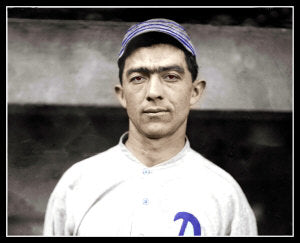July 14, 2012
 The 2012 Phillies aren't in the midst of the most spectacular collapse of a dynasty in Philly baseball history. That happened in 1915. The A's were coming off four World Series appearances in five years, with victories in 3 of them. But success has it's own price, and for Connie Mack, that was trying to keep his players paid. With so much success, the stars of the team were wanting major pay raises. Adding pressure to the problem were a couple of major developments. For one, the Federal League, baseball's USFL more or less, was offering huge wads of money to MLB stars, many of whom played on the A's. And Mack, coming off a season in which fans had become spoiled by success (The A's were 5th in the AL in attendance in 1914 despite winning the pennant), became convinced that fans enjoyed watching a team try to get to the top more than seeing a team already there. He was also losing money to technology. The giant scoreboard the Philadelphia Record had erected across from City Hall was hurting him too (similar to this one at the New York Herald's offices). Fans were showing up for free to "watch" the game on the board instead of paying to get into the ballpark. Finally, he believed his own hype, and thought that if he built this dynasty, why couldn't he start from scratch and build another?
The dismantling began with Mack selling AL MVP Eddie Collins to the White Sox in December of 1914, reportedly for $50,000. (It was with Chicago that Collins is perhaps today best remembered for being the "clean" superstar on the 1919 Black Sox.) Collins was floored by the move, loved playing in Philly and for Mack, but the money Comiskey was offering was just too great to turn down.
The move was not met with derision in Philly or nationally, as most people considered it a smart move. As WA Phelon wrote in Baseball Magazine:
"It reduces the Athletics payroll, brings the needed cash, yet will not hurt the gate. Hence it's a great thing for the Mackmen."
He released the aging Jack Coombs, another hero of the 1911 World Series. Eddie Plank and Chief Bender, though both toward the end of their careers, jumped to the Federal League and the big paydays. Still, the team seemed to be pretty much intact. An aging but capable Nap Lajoie was brought back to town from the Indians to take over for Collins at second base. The three of the four members of the famous $100,000 Infield were still in place and the 4th piece had been replaced by a legend. The team would be fine. Except for one thing.
The 2012 Phillies aren't in the midst of the most spectacular collapse of a dynasty in Philly baseball history. That happened in 1915. The A's were coming off four World Series appearances in five years, with victories in 3 of them. But success has it's own price, and for Connie Mack, that was trying to keep his players paid. With so much success, the stars of the team were wanting major pay raises. Adding pressure to the problem were a couple of major developments. For one, the Federal League, baseball's USFL more or less, was offering huge wads of money to MLB stars, many of whom played on the A's. And Mack, coming off a season in which fans had become spoiled by success (The A's were 5th in the AL in attendance in 1914 despite winning the pennant), became convinced that fans enjoyed watching a team try to get to the top more than seeing a team already there. He was also losing money to technology. The giant scoreboard the Philadelphia Record had erected across from City Hall was hurting him too (similar to this one at the New York Herald's offices). Fans were showing up for free to "watch" the game on the board instead of paying to get into the ballpark. Finally, he believed his own hype, and thought that if he built this dynasty, why couldn't he start from scratch and build another?
The dismantling began with Mack selling AL MVP Eddie Collins to the White Sox in December of 1914, reportedly for $50,000. (It was with Chicago that Collins is perhaps today best remembered for being the "clean" superstar on the 1919 Black Sox.) Collins was floored by the move, loved playing in Philly and for Mack, but the money Comiskey was offering was just too great to turn down.
The move was not met with derision in Philly or nationally, as most people considered it a smart move. As WA Phelon wrote in Baseball Magazine:
"It reduces the Athletics payroll, brings the needed cash, yet will not hurt the gate. Hence it's a great thing for the Mackmen."
He released the aging Jack Coombs, another hero of the 1911 World Series. Eddie Plank and Chief Bender, though both toward the end of their careers, jumped to the Federal League and the big paydays. Still, the team seemed to be pretty much intact. An aging but capable Nap Lajoie was brought back to town from the Indians to take over for Collins at second base. The three of the four members of the famous $100,000 Infield were still in place and the 4th piece had been replaced by a legend. The team would be fine. Except for one thing.
 Third baseman and city legend Home Run Baker (above, left) was torn between returning to the A's or retiring to his farm in Maryland.
At the team's annual banquet in February of 1915, Mack dropped a bombshell, "I can't say that I've had as good a time tonight I've had in years gone by at this banquet. I have given you a lot of surprises lately, but tonight I have a real surprise for you. Frank Baker wrote me a letter that he would not play for the Athletics the coming year. Frank has decided to quit the game for good." The air went out of the banquet hall, and the annual jovial affair took on the air of a funeral reception. Mack continued on.
"He's just sick of traveling and he wants to settle down for good on his Maryland farm. His wife has been at him for years to quit and it has been a tussle to make him sign each season...The boy isn't dissastisfied. He doesn't want more money, and he isn't flighty."
That was partly true. Collins was a country boy who loved his farm. But as he told a reporter that winter, "Every man has his price at which he is willing to work. I have mine. I am not stating what it is, but I will take it if it is offered. I will work for Connie Mack cheaper than I will work for anyone else. But I will not work for Mack or anyone else under the conditions as they are at present."
Baker, a bonified superstar, could not be happy with the fact that he had signed a $6,666 per year contract a year before Collins had signed a $15,000 a year contract. And he certainly wasn't pleased when Mack brought in the 40-year old Lajoie for $9,000. "I wish them all the luck in the world, but I have to look out for my own interests also." At a time where the economy in the US wasn't so hot, Baker's holdout didn't go over real well. Almost all of Philadelphia sided with Mack. Baker had signed a 3-year, $20,000 contract the year before, and now he was breaking it.
When the team reported to Jacksonville that March, Baker was nowhere in sight. Players wrote him. He wrote none of them back. Rumors began to swirl that he would be dealt to the Yankees. He said that he would play in New York, but he would play in Philadelphia for cheaper. It was beginning to look like exactly what TO would want from the Eagles 90 years later; a modest bump to the salary he had already signed, just to show respect for what he had given the team and the city. It's worth noting that in both cases, fans in the city tended to side with management, since both players were so egregiously overpaid to begin with. And in both cases, the loss of the star player resulted in a team going from the championship game to an epic disaster. (Of course, TO would play a few games with the Eagles, while Baker didn't play a single one.)
Baker met with Mack on Opening Day. He wasn't reporting to the team, though you get the feeling that when he talked to Mack, he had to be hoping that the A's leader was going to offer him a token raise and the problem would be solved. It wasn't. Baker asked permission to opt out of his contract and play for a semi-pro team in Delco. The obstinate Mack granted him permission, so long as he didn't play any games in Philadelphia. They had only months previous been the two undisputed kings of the city. Now they went their separate ways.
The A's, without stars Collins and Baker, and with a young pitching staff that Mack had greatly overrated**, made a nosedive into the cellar of the AL. A year after winning 99-games and winning the AL by 8.5 games, they went 43-109, 58.5 games out of first place. The drop of 56-games is still a major league record. (The Phillies would have to go 8-66 for the rest of the season to break it.) Many fans of the A's drifted 6 blocks west and started watching the exciting 1915 Phillies team, who would make their first ever World Series appearance that October.
Baker would play a year of summer league ball in Maryland, then Mack would sell his contract to the Yankees. He would play four years for them, though he never again duplicated his numbers from his Philadelphia days. The A's meanwhile, wouldn't recover from the Collins deal and the Baker fallout until the mid-1920s, when Mack would put together his second dynasty.
A lot of this info comes courtesy of the excellent books, "Connie Mack and the Early Years of Baseball" and "Connie Mack, The Turbulent and Triumphant Years", both by Norman Macht.
**Hmm, losing two best players and overrating young pitchers. Sound familiar?
Third baseman and city legend Home Run Baker (above, left) was torn between returning to the A's or retiring to his farm in Maryland.
At the team's annual banquet in February of 1915, Mack dropped a bombshell, "I can't say that I've had as good a time tonight I've had in years gone by at this banquet. I have given you a lot of surprises lately, but tonight I have a real surprise for you. Frank Baker wrote me a letter that he would not play for the Athletics the coming year. Frank has decided to quit the game for good." The air went out of the banquet hall, and the annual jovial affair took on the air of a funeral reception. Mack continued on.
"He's just sick of traveling and he wants to settle down for good on his Maryland farm. His wife has been at him for years to quit and it has been a tussle to make him sign each season...The boy isn't dissastisfied. He doesn't want more money, and he isn't flighty."
That was partly true. Collins was a country boy who loved his farm. But as he told a reporter that winter, "Every man has his price at which he is willing to work. I have mine. I am not stating what it is, but I will take it if it is offered. I will work for Connie Mack cheaper than I will work for anyone else. But I will not work for Mack or anyone else under the conditions as they are at present."
Baker, a bonified superstar, could not be happy with the fact that he had signed a $6,666 per year contract a year before Collins had signed a $15,000 a year contract. And he certainly wasn't pleased when Mack brought in the 40-year old Lajoie for $9,000. "I wish them all the luck in the world, but I have to look out for my own interests also." At a time where the economy in the US wasn't so hot, Baker's holdout didn't go over real well. Almost all of Philadelphia sided with Mack. Baker had signed a 3-year, $20,000 contract the year before, and now he was breaking it.
When the team reported to Jacksonville that March, Baker was nowhere in sight. Players wrote him. He wrote none of them back. Rumors began to swirl that he would be dealt to the Yankees. He said that he would play in New York, but he would play in Philadelphia for cheaper. It was beginning to look like exactly what TO would want from the Eagles 90 years later; a modest bump to the salary he had already signed, just to show respect for what he had given the team and the city. It's worth noting that in both cases, fans in the city tended to side with management, since both players were so egregiously overpaid to begin with. And in both cases, the loss of the star player resulted in a team going from the championship game to an epic disaster. (Of course, TO would play a few games with the Eagles, while Baker didn't play a single one.)
Baker met with Mack on Opening Day. He wasn't reporting to the team, though you get the feeling that when he talked to Mack, he had to be hoping that the A's leader was going to offer him a token raise and the problem would be solved. It wasn't. Baker asked permission to opt out of his contract and play for a semi-pro team in Delco. The obstinate Mack granted him permission, so long as he didn't play any games in Philadelphia. They had only months previous been the two undisputed kings of the city. Now they went their separate ways.
The A's, without stars Collins and Baker, and with a young pitching staff that Mack had greatly overrated**, made a nosedive into the cellar of the AL. A year after winning 99-games and winning the AL by 8.5 games, they went 43-109, 58.5 games out of first place. The drop of 56-games is still a major league record. (The Phillies would have to go 8-66 for the rest of the season to break it.) Many fans of the A's drifted 6 blocks west and started watching the exciting 1915 Phillies team, who would make their first ever World Series appearance that October.
Baker would play a year of summer league ball in Maryland, then Mack would sell his contract to the Yankees. He would play four years for them, though he never again duplicated his numbers from his Philadelphia days. The A's meanwhile, wouldn't recover from the Collins deal and the Baker fallout until the mid-1920s, when Mack would put together his second dynasty.
A lot of this info comes courtesy of the excellent books, "Connie Mack and the Early Years of Baseball" and "Connie Mack, The Turbulent and Triumphant Years", both by Norman Macht.
**Hmm, losing two best players and overrating young pitchers. Sound familiar?

